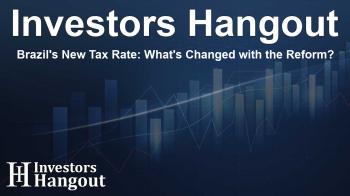Brazil's New Tax Rate: What's Changed with the Reform?

Understanding Brazil's Tax Reform Changes
The Brazilian tax landscape has seen significant changes recently. The final version of the tax reform, which has been sanctioned by President Luiz Inacio Lula da Silva, presents a tax rate that is slightly revised from the previous rate that was approved by Congress. Special tax secretary Bernard Appy provided insights into these adjustments.
Final Tax Rate Adjustments
According to Bernard Appy, the ultimate tax rate will maintain the core elements of the legislation initially passed by the lower house and later discussed in the Senate. This indicates that, while there are adjustments, the overarching structure of the tax reform remains intact.
Technical Justifications for Vetoes
Appy noted that any vetoes made during the reform process were based on either technical adjustments or concerns regarding constitutional validity. This reflects an approach focused on ensuring the reform's compliance with existing legal frameworks while attempting to enhance efficiency.
New Consumption Tax Overview
The Brazilian Ministry of Finance has also indicated that the standard rate for the new consumption tax is projected to be approximately 28%. This rate change represents a critical element of the reform, aimed at simplifying the tax structure and boosting economic productivity.
Implications for the Economy and Taxpayers
The introduction of this new tax regime is expected to have widespread implications for various sectors within Brazil. For taxpayers, understanding how the new tax rate affects their financial responsibilities will be crucial. The reform is designed to create a more equitable tax environment while fostering economic growth.
Looking Ahead: The Future of Taxation in Brazil
As Brazil implements these changes, the long-term impacts on the economy will be closely observed by both policymakers and citizens. Greater clarity around tax obligations may potentially lead to increased compliance and, subsequently, improved revenue collection for the government's initiatives.
Engaging with Stakeholders
The Brazilian government has also emphasized the importance of engaging various stakeholders during this transition period. By fostering dialogue between the government and the public, the hope is to create a more informed citizenry and ultimately a more effective tax system.
Frequently Asked Questions
What is the main change in Brazil's tax reform?
The main change is the adjustment of the final tax rate, which is slightly higher than the rate approved by Congress.
What will the new standard consumption tax rate be?
The new standard consumption tax rate in Brazil is projected to be around 28%.
Why were certain parts of the tax reform vetoed?
Vetoes were made based on technical adjustments and constitutional questions to ensure the reform remains valid and effective.
How does the reform aim to affect taxpayers?
The reform seeks to create a more equitable tax system, making it clearer and potentially easier for taxpayers to understand their obligations.
What is the expected impact of the reform on the economy?
The reform is expected to simplify the tax structure, increase compliance, and boost overall economic productivity.
About The Author
Contact Addison Perry privately here. Or send an email with ATTN: Addison Perry as the subject to contact@investorshangout.com.
About Investors Hangout
Investors Hangout is a leading online stock forum for financial discussion and learning, offering a wide range of free tools and resources. It draws in traders of all levels, who exchange market knowledge, investigate trading tactics, and keep an eye on industry developments in real time. Featuring financial articles, stock message boards, quotes, charts, company profiles, and live news updates. Through cooperative learning and a wealth of informational resources, it helps users from novices creating their first portfolios to experts honing their techniques. Join Investors Hangout today: https://investorshangout.com/
The content of this article is based on factual, publicly available information and does not represent legal, financial, or investment advice. Investors Hangout does not offer financial advice, and the author is not a licensed financial advisor. Consult a qualified advisor before making any financial or investment decisions based on this article. This article should not be considered advice to purchase, sell, or hold any securities or other investments. If any of the material provided here is inaccurate, please contact us for corrections.

